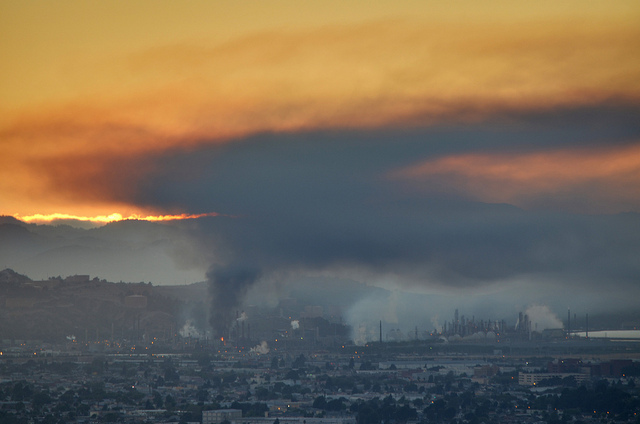By David McCoard
 Unknown to personnel in Richmond’s Chevron refinery, the walls of an eight-inch pipe carrying a 450-degree, high-sulfur oil distillation were getting dangerously thin. Refinery personnel were aware that sulfur in material flowing through a carbon steel pipe gradually reacts with and corrodes the steel, and there were inspection procedures in place. But this pipe had not been inspected for a long time.
Unknown to personnel in Richmond’s Chevron refinery, the walls of an eight-inch pipe carrying a 450-degree, high-sulfur oil distillation were getting dangerously thin. Refinery personnel were aware that sulfur in material flowing through a carbon steel pipe gradually reacts with and corrodes the steel, and there were inspection procedures in place. But this pipe had not been inspected for a long time.
On August 6, 2012 liquid began dripping from this pipe. Efforts to deal with the leak led to a cascade of events culminating in the eruption and ignition of a cloud of dense vapor and of the contents of the pipe itself, which was still flowing. Workers barely escaped with their lives, but thankfully their injuries were minor. A column of black smoke rose above the refinery, visible for miles. An estimated 15,000 people sought medical attention after breathing hydrogen sulfide fumes.
Chevron’s Richmond refinery is part of a huge organization which has been in business since 1879. Over time, communications between units and levels of the company became lacking, and authority became scattered. In Richmond, recent warnings and recommendations by a separate technical research unit didn’t get sufficiently communicated to or acted on by process authorities.
Fast-forward to Spring 2018 — Chevron and the City of Richmond reached a settlement of the City’s suit, resulting in a payout to the City of $5 million. Then in October the company settled with the EPA for violating the Clean Air Act resulting in accidents in Richmond, Southern California and Mississippi.
According to the EPA, as part of the settlement, Chevron will spend $150 million to replace vulnerable pipes, improve its corrosion inspections and trainings, conduct pilot studies of safety controls, and make other safety improvements to all its U.S. refineries. This will include extensive pipe work and training of personnel here. In addition, the company will pay $2.95 million in fines.
All this may come as cold comfort for refinery-adjacent communities breathing toxic air on a daily basis — not to mention everyone impacted by climate change-fuelled wildfires, hurricanes, droughts, and sea-level rise. Chevron reported earnings of $9.2 billion in 2017. The recent settlements don’t even represent a drop in the bucket compared to the damage they’ve done. We’ve got to keep working to transition away from the dirty fuels that are poisoning the most vulnerable among us and destabilizing our planet.
David McCoard is chair of the Bay Chapter's Energy & Climate Committee
Photo: 2012 Richmond refinery fire by Daniel Parks